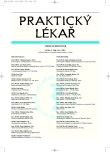Posttraumatic stress disorder (PTSD)
Posttraumatická stresová porucha (PTSD)
V přehledném článku autor shrnuje současné poznatky o výskytu, příznacích, průběhu, prognóze a léčbě posttraumatické stresové poruchy (PTSD), která se vyskytuje častěji, než je diagnostikována. Až v 80 % případů může být spojena s depresí. Vzhledem k latenci příznaků ve dnech až týdnech od závažné traumatické události, připadá významná role v diagnostice traumatologům a zejména praktickým lékařům. Po příznacích je třeba aktivně pátrat a poruchu nelze bagatelizovat. Léčba spočívá v psychoterapii, případně kombinované s podáváním psychofarmak. V závěru autor doporučuje správný postup v zapamatovatelných 10 bodech.
Klíčová slova:
posttraumatická stresová porucha, akutní reakce na stres, antidepresiva, SSRI.
Authors:
V. Pidrman
Authors‘ workplace:
Přednosta: doc. MUDr. Vladimír Pidrman, Ph. D
; Klinika psychiatrie LF UP a FN Olomouc
Published in:
Prakt. Lék. 2007; 87(10): 615-617
Category:
Various Specialization
Overview
In a review article the author outlines the up-to-date knowledge of incidence, symptomatology, course, prognosis and treatment of posttraumatic stress disorder (PTSD), that occurs more frequently than it is diagnosed. In up to 80 % of cases it may be associated with a depression. With regard to a latency in days to weeks after a serious traumatic event, an important role in diagnostics falls on traumatologists, and particularly on general practitioners. It is necessary to actively search for symptoms of this disorder which should not be underestimated. Treatment consists in psychotherapy, combined eventually with antidepressant drugs. In the end the author recommends a guideline in ten „keep in mind“ points.
Key words:
posttraumatic stress disorder, acute stress disorder.
Labels
General practitioner for children and adolescents General practitioner for adultsArticle was published in
General Practitioner

2007 Issue 10
- Advances in the Treatment of Myasthenia Gravis on the Horizon
- Hope Awakens with Early Diagnosis of Parkinson's Disease Based on Skin Odor
- Memantine in Dementia Therapy – Current Findings and Possible Future Applications
- Memantine Eases Daily Life for Patients and Caregivers
- Possibilities of Using Metamizole in the Treatment of Acute Primary Headaches
-
All articles in this issue
- Diabetes, pre-diabetes and cardiovascular diseases
- Pneumothorax. Overview and current therapeutic options.
- Hemochromatosis – a current review
- Prion diseases in humans
- Urological complications of gynaecologic surgery
- Tumour of the hands
- Regulation of bone cell metabolism at the cellular and molecular level
- Posttraumatic stress disorder (PTSD)
- Initial experience using a laser-balloon endoscopic catheter for the treatment of patients with paroxysmal atrial fibrillation
- Colorectal cancer and inflammatory bowel diseases.
- Progressive heart failure due to cardiac amyloidosis
- General Practitioner
- Journal archive
- Current issue
- About the journal
Most read in this issue
- Urological complications of gynaecologic surgery
- Pneumothorax. Overview and current therapeutic options.
- Posttraumatic stress disorder (PTSD)
- Hemochromatosis – a current review
